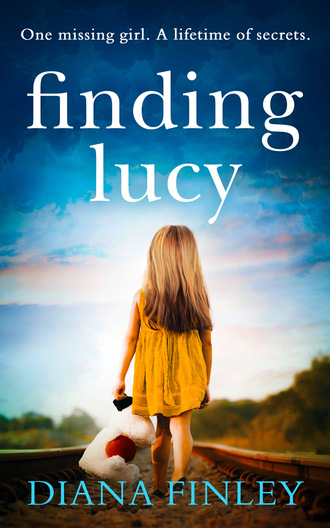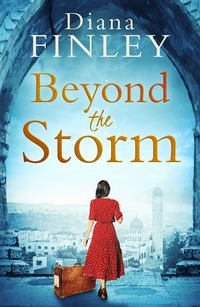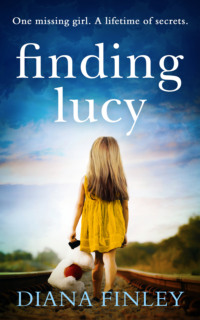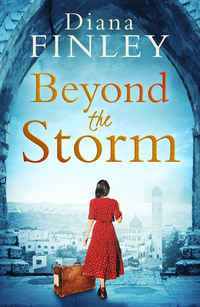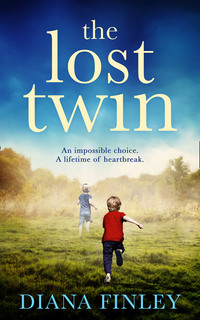
About Diana Finley
DIANA FINLEY was born and grew up in Germany, where her father was a British Army officer. After a move to London, at eighteen, Diana spent a year living with nomadic people in the remote Pamir mountains of Afghanistan – an experience about which she wrote several stories and accounts. These helped secure her first job, as copywriter and then as writer and editor of children’s information books for Macdonald Educational Publishers.
A move to North East England meant changing direction. Diana took a degree in Speech and Psychology, and worked for many years as a Specialist in Autism, publishing a professional book. In 2011 she completed an MA in Creative Writing with distinction at Newcastle University. In 2014 her debut novel, The Loneliness of Survival, a moving family saga, was published.
Diana enjoys exploring complex and often contradictory characters and emotions in her writing. Finding Lucy, her second novel, is a dark, intriguing, psychological story about every parent’s worst nightmare – a stolen child.
Finding Lucy
DIANA FINLEY

HQ
An imprint of HarperCollinsPublishers Ltd.
1 London Bridge Street
London SE1 9GF
First published in Great Britain by HQ in 2018
Copyright © Diana Finley
Diana Finley asserts the moral right to be identified as the author of this work.
A catalogue record for this book is available from the British Library.
This novel is entirely a work of fiction. The names, characters and incidents portrayed in it are the work of the author’s imagination. Any resemblance to actual persons, living or dead, events or localities is entirely coincidental.
All rights reserved under International and Pan-American Copyright Conventions. By payment of the required fees, you have been granted the non-exclusive, non-transferable right to access and read the text of this e-book on-screen. No part of this text may be reproduced, transmitted, downloaded, decompiled, reverse engineered, or stored in or introduced into any information storage and retrieval system, in any form or by any means, whether electronic or mechanical, now known or hereinafter invented, without the express written permission of HarperCollins.
E-book Edition © September 2018 ISBN: 9780008297749
Version: 2018-11-05
For Harvey, who may read it one day.
Table of Contents
Cover
About Diana Finley
Title Page
Copyright
Dedication
Chapter One
Chapter Two
Chapter Three
Chapter Four
Chapter Five
Chapter Six
Chapter Seven
Chapter Eight
Chapter Nine
Chapter Ten
Chapter Eleven
Chapter Twelve
Chapter Thirteen
Chapter Fourteen
Chapter Fifteen
Chapter Sixteen
Chapter Seventeen
Chapter Eighteen
Chapter Nineteen
Chapter Twenty
Chapter Twenty-One
Chapter Twenty-Two
Chapter Twenty-Three
Chapter Twenty-Four
Chapter Twenty-Five
Chapter Twenty-Six
Chapter Twenty-Seven
Chapter Twenty-Eight
Chapter Twenty-Nine
Chapter Thirty
Chapter Thirty-One
Chapter Thirty-Two
Chapter Thirty-Three
Chapter Thirty-Four
Chapter Thirty-Five
Chapter Thirty-Six
Chapter Thirty-Seven
Chapter Thirty-Eight
Chapter Thirty-Nine
Chapter Forty
Chapter Forty-One
Chapter Forty-Two
Chapter Forty-Three
Chapter Forty-Four
Chapter Forty-Five
Chapter Forty-Six
Chapter Forty-Seven
Chapter Forty-Eight
Chapter Forty-Nine
Chapter Fifty
Chapter Fifty-One
Chapter Fifty-Two
Chapter Fifty-Three
Chapter Fifty-Four
Chapter Fifty-Five
Chapter Fifty-Six
Chapter Fifty-Seven
Chapter Fifty-Eight
Chapter Fifty-Nine
Chapter Sixty
Chapter Sixty-One
Chapter Sixty-Two
Chapter Sixty-Three
Chapter Sixty-Four
Chapter Sixty-Five
Acknowledgements
Dear Reader …
About the Publisher
Chapter One
1984
Alison
It was after seeing the grave that I finally decided to take a child. There was nothing special about it – the grave, that is. Not one of those ghastly, over-sentimentalised affairs sprouting angels’ wings or teddy bears. Quite plain. A simple stone and a concise message:
In memory of our dearly loved little girl
Lucy Sarah Brown aged 2 years
Born 20-9-1982 – Died 16-10-1984
Safe in the hands of Jesus
Somehow, imagining little Lucy’s life – and her demise – touched me deeply, coming as it did just a month after Mother’s death. How desperately tragic. What might have killed a child so young? A car accident? Meningitis? A hole in the heart? How her parents must have suffered. How they must have grieved for their “dearly loved little girl” – still be grieving, in fact; she’d been gone only two months, after all. So very sad.
As I thought about it, I almost wished I could share my plans with them: with Lucy’s original parents. Let them know that, in a sense, their Lucy was going to be brought back to life; I was going to bring Lucy back to life! Perhaps they would be comforted by that thought. Of course, telling them would never be possible, and anyway, she would cease to be their Lucy. She would become my Lucy. Lucy would be my secret. She would be my daughter, my secret daughter. How perfect! Lucy Brown. A fine, tasteful name – yet “normal”. Not one that stood out too vividly, just like the sad little grave.
It wasn’t as though I had planned the whole thing beforehand, thought it through – not at that stage. The idea grew out of a medley of thoughts that had been swirling in my mind; indistinct, like miscellaneous letter-shaped noodles stirred into soup, sometimes emerging for a moment to make meaningful combinations on the surface, then breaking up and disappearing into the depths of the pot. Stumbling upon the grave that day drew the letters together, began to make order and sense of them. I had decided.
It was a bright, crisp December day. Long shadows streaked the wet grass. Early afternoon, but already the sun was starting its descent towards the rooftops. As often before, I had been wandering through one of the city’s urban cemeteries. Not that I was attracted to such places for any macabre reasons. No, it was the quiet I yearned for, the peace, and perhaps the sense of the past. This was a particularly agreeable cemetery: serene, well maintained and cared for, with mature trees and shrubs creating a screen from the surrounding suburban streets, emphasising the separateness of the graveyard.
At first I had been drawn to the grave simply by the fresh, bright flowers arranged in neat vases, which contrasted with the faded, bedraggled blooms nearby. But standing there in front of the grave, my attention soon moved on from the flowers. I was mesmerised by the name: Brown. It is natural to notice one’s own surname. I stood and gazed at the neat letters, the scrolled stonework marking the boundary of the pitifully small grave and containing shiny gravel of various colours: pink, brown, yellow and green. On the headstone, carved stone hands curved beneath the words “Safe in the hands of Jesus” as though gently lifting them – or perhaps Lucy herself – upwards, heavenwards.
All the while, as my eyes absorbed these details, my heart was beating unevenly and with great excitement. A plan started to take shape in my mind. It was so simple; Lucy Brown would become my child – indeed, my invention. Just as, years ago, Mother had created me as Alison Brown. I could hardly wait to get home and begin to put my ideas onto paper.
Chapter Two
Once back in my own house on the other side of Nottingham, I made a cup of tea, sat down at my desk and started to write a list. I love to make lists. So reassuring. Firstly, the birth certificate. Having that in my possession would make it all seem real. This first item on the list occupied me for quite some time. I worried about the application process though. Would proof of identity be required?
As it turned out, discovering the details of Lucy Brown’s parents’ names and dates of birth was extraordinarily simple. All I had to do was to write to the General Register Office giving Lucy’s first name, surname and date of birth – and requesting a copy of her birth certificate. An address was required. I provided my own, of course. I sent the modest payment as indicated – and a week or so later the precious document was in my hands. I studied it with a trembling thrill; it was almost as though I held Lucy herself, as if she was reborn!
Her mother’s name was given as Audrey Brown, and her father’s as Russell Brown. That would need some adjustment in time of course. I would be her mother, Alison Brown – but then people often used a different first name to the original one.
This was just the beginning. Much needed to be done, but that did not deter me, not at all. Indeed, anticipating the tasks ahead filled me with great pleasure and excitement.
I had already decided to stop working for a time. Mother’s death had left me feeling deeply unsettled. It had always been just the two of us. Apart from my brief and unhappy sojourn at university, I could scarcely remember spending a night apart from her. Or rather, the very few occasions when we had been apart stood out in my memory as rarities; exceptional – and a little frightening.
Now suddenly I found myself completely alone. During those initial weeks of bereavement, I found it impossible to enjoy anything of ordinary, domestic life – for example, mealtimes. I ate almost nothing at all. Sitting alone at the table where, all my life, Mother and I had sat together, sharing the small events and anecdotes of the day, felt almost as though I were in the grave rather than Mother. I found little pleasure in my own company.
Sleep was even more difficult. I tried to postpone the moment of plunging myself into darkness by reading for as long as possible – often reading the same passage over and over again – until exhaustion forced me to switch off the light. As if by signal, this act heralded a succession of morbid, disturbing and often terrifying thoughts, which would not be still. Sometimes I was obliged to get up and make myself a cup of camomile tea, and sit with it in the armchair in the soft light of the kitchen, until a fitful sleep eventually overcame me.
Dr Munroe, who had known me since I was an infant, suggested a mild sleeping pill might help – ‘just during these sad and difficult early weeks, my dear’. I accepted his prescription, but never swallowed a single one of his pills. No, it was not my preferred way. It was important to remain in control of my consciousness.
At the office, my mind would not focus properly. Every task seemed difficult, yet nothing seemed to matter to me as before. I felt the need for a complete change, a time for peace and reflection; a time to reconsider my life and my future. Perhaps it was something to do with having turned forty last year. Not that I believed in phenomena such as “mid-life crises”, but it was surely reasonable to regard forty as a chance to embark on new endeavours. So, back in November, not long after Mother’s will was read, I had handed in the obligatory three months’ notice at Chambers.
‘So what are you going to do, Alison?’ asked Mrs Anderson, the administrative manager (promoted well above her capabilities, I always believed). ‘Have you found another job to go to?’
‘Not exactly. I feel it’s time to re-evaluate, to think about the next period of my life and work out exactly what I want to do with it.’
Mrs Anderson sniffed. ‘Re-evaluate? Sounds a bit of a luxury to me. “Re-evaluation” isn’t something most of us can afford. Still, I suppose it’s unsettling to lose your mum when you’ve always spent so much time together – is that it?’
‘Certainly losing Mother has been a blow …’ I paused for a moment.
Mrs Anderson sighed and glanced at her watch.
‘Yes,’ I said hastily, ‘you’re right, very unsettling.’
Despite this unsatisfactory exchange, I was touched to note the genuine regret expressed by most of my colleagues at my leaving – both the legal team and the administrative staff.
‘S’pect you’ll miss us ’ere in the office, won’t you, Alison? What you goin’ to do wiv yourself all the time?’ Julie was the newest office recruit. Her long nails clacked away on her typewriter.
‘I’m sure I’ll find plenty to occupy my time, Julie.’
‘Oh yeah, goin’ to museums and libraries and that?’ She winked at Debbie and they giggled, without revealing the source of their amusement. Certainly, I mused, I would not miss the banality of office conversation.
It was clear that Mrs Anderson was at least sensitive enough to register the strength of my determination, because at no time did she try to dissuade me from my decision. She had never been generous with praise, so it was a particular pleasure to see myself described with words such as “efficient”, “invaluable”, “intelligent”, “loyal” and “highly valued” in the brief note about my departure circulated to the staff. It would have been perfectly proper for Mrs Anderson to have written a personal note or card to me at home, and perhaps to have wished me well, but this was not her way.
At the end of my last day at Chambers, a select gathering had been arranged in the main office by way of a “leaving do”. Cups of my favourite Earl Grey tea and a tray of tasteful and dainty iced cakes were handed around by the juniors. I was seen off with a gift token, a bunch of flowers and a jovial peck on the cheek by Sir Julian, delivered amid the usual waft of winey fumes – he had not long returned from his usual lunchtime expedition.
‘A new year, a new life! Eh, my dear? Jolly good for you.’
I tried to smile benignly. He could never have imagined how true those words were!
Chapter Three
I had wanted a child of my own for as many years as I could remember. I might even admit to having felt a desperate longing for a child. I frequently recall Mother’s words to me during the last days of her life.
‘Don’t live alone, Alison,’ she had said. ‘It’s not good for you, dear. I do so wish for you to have a child – a child to love, and to love you. I won’t be a grandmother, of course – it’s too late for that – but if only I could know that you will have the joy of being a mother, as I did with you; that would be such a comfort for me.’
‘You’re right, Mother,’ I had told her soothingly, Mother’s hand in mine as frail and fleshless as a chicken’s claw.
‘Please don’t worry – I want to have a child. I will have a child, I promise.’
Perhaps it was a rash promise, but I had genuinely meant those words. Three days later Mother was dead. I had underestimated the impact her loss would have on me. She had been right; I needed someone to love, and to love me. I needed a child. That need grew in me until it was all-consuming.
* * *
Of course, I had tried all avenues: conventional means some might say. But none felt truly right for me. Why not give birth to a child of your own, some might ask. The fundamental barrier is that first a man is required. My attitude to men had been permanently coloured by the event at university some years before. I didn’t dislike men, but neither did I trust them, and they had never played a significant role in my life. I could not envisage the constant presence of a man in my home, in my life. Above all, I regarded acts of physical intimacy with a man with the utmost revulsion.
Some women might even pursue what I understood were referred to as “one-night stands” – a revolting term – but this was not a path I could ever have contemplated. Even thinking about it caused me to tremble and feel quite nauseous. Thus I had dispensed with the idea of “natural” means of having a child.
Next, I considered the possibility of artificial insemination. However, I could never have submitted myself to such a humiliating procedure – little better than the means by which a prize cow might be used for breeding.
Having dismissed all these avenues, I looked into legal adoption. One would imagine that a respectable woman, still in her thirties at that time, and willing to offer a home to an unwanted waif, would be welcomed with open arms. Not so! After weeks of visits from social workers and their ceaseless interviews and questionnaires, I had been told that I was not considered suitable to adopt a child. Not suitable! “The team” had decided – “regretfully” – that I was not suited to bringing up a child, especially a young and vulnerable child, they said. Words like “judgemental”, “lacking in empathy”, and “rigid personality” had been bandied about; meaningless psycho-babble straight out of some left-wing social work textbook, no doubt. And thus this questionable group of people had passed their own judgement on me.
There had been no means of appeal. As will be appreciated by anyone with a scrap of insight, I had been left with no choice but to take the matter into my own hands.
Chapter Four
By February, I was taking the first steps towards a fundamentally different future. I had decided on Newcastle for its distance from Nottingham, and as a fine, distinctive city in its own right. Only Newcastle’s proximity to Durham, with that city’s sad associations for me, made me hesitate over my choice at first. Yet the advantages were clear and I resolved to overcome my doubts, and to look firmly down at a book rather than out of the window as the train passed through Durham station.
I made my very specific wishes quite clear to the Homefind estate agency. As a widow with a small daughter, I explained, I was looking for a smallish house, with three bedrooms, preferably detached, with a neat, easy-to-manage and secure back garden, to allow the child to play safely. I felt no qualms about presenting myself in this way – in my mind I was already Lucy’s mother.
The agency soon found a very suitable house on a predominantly post-Fifties estate on the edge of the suburb of Gosforth. It was perfect for my needs, having one bedroom off the “half-landing”, and two further bedrooms with dormer windows set into the slope of the roof. It was described as a “Dutch bungalow”. I liked the term. It gave my new home a touch of the exotic, while retaining a wholesome image.
The house was freshly whitewashed and stood at the end of a quiet cul-de-sac, its garden backing onto a pleasant area of trees and fields where people strolled and walked their dogs. There was even a small playground nearby – ideal for Lucy. The neighbouring houses were far enough away for me not to feel overlooked. My – sorry, our! – new home (I would have to get used to using the plural pronoun) had been well maintained by the elderly couple who were selling it. Certainly, the decoration was a little old-fashioned, but that didn’t matter to me. Thanks to Mother’s carefully invested estate, added to the anticipated sale of our house in Nottingham, and my own smaller savings, I was able to contemplate not working while caring for a young child. This was very important to me; far too many young children were placed in the care of nurseries or childminders. I had no intention of Lucy becoming a “latch-key” child.
Fortunately, there were spare funds to put in a new kitchen and bathroom, and for fresh wallpaper and paint throughout. Mother had never been a great spender, but she would have enjoyed discussing decoration and soft furnishings with me, especially when it came to Lucy’s room. At times like this I missed her terribly. In fact, if I am truthful, not a moment went by when I did not miss her, but at least having so much to occupy my mind did help.
It was vital to be able to come and go freely at the new house over the coming weeks, without arousing curiosity or suspicion. One of my first tasks was to visit the next-door neighbours on either side and introduce myself. I’d never been one for dropping in and out of other people’s homes, so I felt a degree of anxiety about these initial contacts. To the left was a youngish couple, Susan and Mike Harmon. They had a nice polite little girl of about nine called Claire, and a younger boy, Charlie, who seemed somewhat boisterous and over-excitable.
‘Come on in, it’s just lovely to meet you, Alison!’ said Susan, eagerly taking my arm as I hesitated on the doorstep. ‘Come into the kitchen and let’s have a cup of tea.’
Susan didn’t think to ask what sort of tea I might prefer. In fact, she served what Mother would have called “builders’ tea”, but I drank it and made no comment.
‘So you see, we’ll be coming up in a while – my little girl Lucy and I – just as soon as the house is ready,’ I explained.
‘Ooh, how lovely! It’ll be so nice for all of us to have a younger family next door. Charlie – did you hear that? A little girl next door for you to play with!’ Susan turned back to me. ‘How old is Lucy?’
I almost panicked for a moment. I felt a rush of colour swarming up my neck and cheeks. How could I know exactly how old Lucy was?


